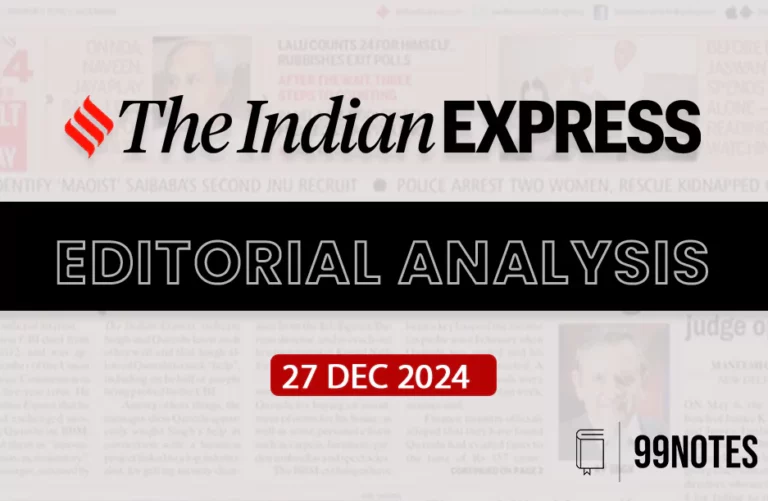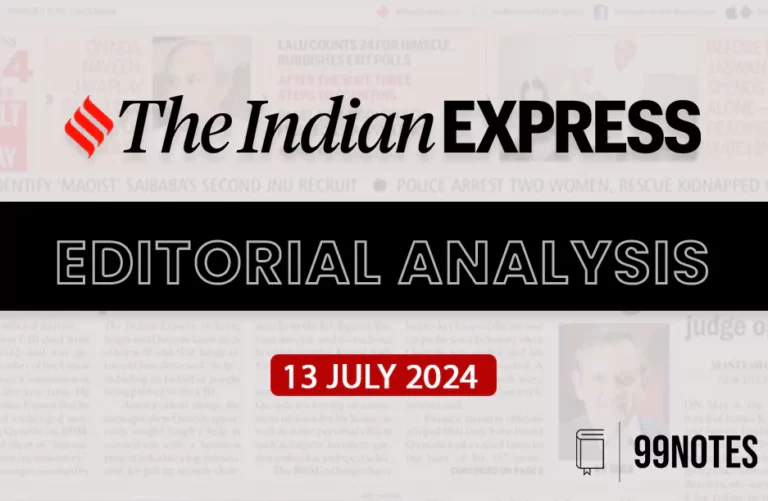20 Feb 2024 : Indian Express Editorial Analysis
Indian Express Editorial Analysis
20-February-2024
1. A wider viewfinder
|
Topic: GS2 – International Relations This topic is relevant for both Prelims and Mains in the context of understanding India’s participation in international forums like the Raisina Dialogue and Milan Exercise provides crucial insights into India’s foreign policy objectives, strategic engagements, and diplomatic initiatives. |
| Context: |
|
Raisina Dialogue: Fostering Global Discourse:
- The Raisina Dialogue, hosted by the Observer Research Foundation and the Ministry of External Affairs, serves as a platform to promote India-centric global agendas.
- Bringing together ministers, officials, scholars, and policy researchers from across the world, this event facilitates discourse on pressing international issues.
- Its significance lies in its role in shaping narratives and fostering transnational networks, thereby enhancing India’s influence in global affairs.
- Moreover, the inclusion of intelligence officials on its margins underscores the emergence of “intelligence diplomacy” as a consequential aspect of India’s diplomatic engagements.
Milan Exercise: Strengthening Naval Diplomacy:
- The Milan Exercise, held biennially in the Bay of Bengal, serves as a crucial forum for naval leaders to engage in professional exchanges on maritime issues.
- Originating as a modest initiative in the early 1990s, it has evolved into a multilateral endeavor showcasing India’s strategic salience in the Indo-Pacific region.
- By actively participating in such exercises, India’s navy demonstrates its internationalist outlook and contributes to regional maritime security.
- The Milan Exercise complements India’s broader naval diplomacy efforts and underscores its commitment to collaborative security initiatives.
Intelligence Diplomacy: Enhancing National Security:
- The concept of “intelligence diplomacy” emerges as an essential component of India’s national security strategy amidst evolving security challenges.
- As international terrorism, cross-border criminal networks, and great power rivalry continue to shape global dynamics, intelligence cooperation becomes increasingly vital.
- India’s engagement in intelligence sharing networks with like-minded countries underscores its shift from isolationism to building productive partnerships.
- This aligns with India’s strategy of building regional and global coalitions to address contemporary security threats and modernize its intelligence agencies.
Conclusion:
- The events of this week highlight India’s multifaceted diplomatic approach, encompassing discourse diplomacy, naval engagement, and intelligence cooperation.
- By actively participating in international forums, exercises, and intelligence networks, India demonstrates its commitment to addressing global challenges and enhancing its role on the world stage.
- These initiatives reflect India’s evolving diplomatic strategies and its proactive efforts to shape international agendas in alignment with its national interests.
| About Milan Exercise: |
Significance:
|
|
PYQ: Consider the following in respect of Indian Ocean Naval Symposium (IONS): (2017) 1) Inaugural IONS was held in India in 2015 under the chairmanship of the Indian Navy. 2) IONS is a voluntary initiative that seeks to increase maritime co-operation among navies of the littoral states of the Indian Ocean Region. Which of the above statements is/are correct? (a) 1 only (b) 2 only (c) Both 1 and 2 (d) Neither 1 nor 2 Ans: (b) |
| Practice Question: India’s expanding diplomatic engagements, as exemplified by events like the Raisina Dialogue, Milan Exercise, and intelligence diplomacy, signify a paradigm shift in its foreign policy approach. Discuss the significance of these initiatives in the context of India’s strategic objectives, regional influence, and global partnerships. (250 words/15 m) |
2. THE NEXT STEP FOR FARMERS
| Topic: GS3 – Agriculture – Storage, transport and marketing of agricultural produce, Food Security This topic is relevant for both Prelims and Mains in the context of understanding India’s potential in horticulture and the strategies for enhancing F&V production. |
| Context: |
|
Disruption and Potential in Agri-Inputs:
- The increase in horticulture production signifies a transformation in farming practices and unlocks potential in the agri-inputs sector, particularly seeds, agrochemicals, and fertilizers.
- While seeds hold the highest potential for disruption in the long term, agrochemicals offer substantial realizable potential in the short term.
- With advancements in digital technology and a focus on bio-based and sustainable solutions, India is poised to address key challenges in horticulture value chains.
Empowering Smallholder Farmers:
- Horticulture farming not only promises higher incomes but also provides a steady revenue stream throughout the year, diverging from traditional subsistence farming.
- However, the viability of horticulture for smallholder farmers hinges on addressing the twin needs of productivity improvement and better price realization.
- Leading agri-tech startups have adopted an integrated value-chain approach, ensuring consistent prices for farmers through value-added, export-led businesses, and providing advisory and agri-inputs supply to improve yield.
Innovation in Seeds and Integrated Farming:
- Innovations in seeds, including agronomic and genetic advancements, have the potential to empower farmers to achieve higher output with fewer inputs.
- High-quality seeds can extend the availability window and geographical footprint for cultivation.
- Additionally, the 1.0-hectare model of integrated farming, piloted in various districts, offers a promising approach for climate-resilient agriculture.
- This model integrates multiple interventions such as solar-powered farming equipment, water conservation practices, and diversified cropping, enabling smallholder farmers to adopt horticulture with limited risk.
Tailored Approach and Multi-Stakeholder Partnerships:
- Success in the F&V sector necessitates a tailored approach to agri-inputs across India’s diverse agro-climatic zones.
- Affordability and accessibility of these inputs are crucial alongside technological advancements.
- Strengthening multi-stakeholder partnerships among farmers, government, customers, industry, and academia/research is vital for achieving demand-backed production, high productivity, robust credit, and risk management, and market linkages.
- Collaboration and shared commitment are essential as India endeavors to become a global F&V hub, driving real income and livelihood growth for smallholder farmers.
| What is Horticulture? |
Features of Horticulture in India
|
| PYQ: Assess the role of National Horticulture Mission (NHM) in boosting the production, productivity and income of horticulture farms. How far has it succeeded in increasing the income of farmers? (250 words/15m) (UPSC CSE (M) GS-3 2018) |
| Practice Question: Discuss India’s potential to emerge as a global leader in fruit and vegetable (F&V) production by 2030, focusing on the opportunities and challenges associated with harnessing this potential. (250 words/15 m) |
For Enquiry

20 Feb 2024 : Indian Express Editorial Analysis

19 Feb 2024 : Daily Current Affairs Quiz

19 Feb 2024 : Daily Answer Writing

19 Feb 2024 : Daily Current Affairs

19 February 2024 : The Hindu Editorial Notes PDF

19 February 2024 : PIB Summary for UPSC

19 Feb 2024 : Indian Express Editorial Analysis

17 Feb 2024 : Daily Current Affairs Quiz

17 Feb 2024 : Daily Answer Writing

17 Feb 2024 : Daily Current Affairs
Indian Express 20 Feb 2024 : Indian Express Editorial Analysis Indian Express Editorial Analysis
20-February-2024
1. A wider viewfinder
Topic: GS2 – International…
Daily Quiz 19 Feb 2024 : Daily Current Affairs Quiz 19 Feb 2024 : Daily Quiz…
mains answer writing 19 Feb 2024 : Daily Answer Writing Mains Answer Writing
19-February-2024
Q1) “Judicial activism is an effective way to promote democratic…
Daily Current Affairs 19 Feb 2024 : Daily Current Affairs Daily Current Affairs
19-February-2024- Top News of the Day
1. New Lapwing observed at Warangal lake,…
Feb 2024 The Hindu 19 February 2024 : The Hindu Editorial Notes PDF The Hindu Editorial
19-February-2024
1. A ruling that gives primary school teaching a new slate.
Topic:…
feb 2024 PIB 19 February 2024 : PIB Summary for UPSC PIB Summary for UPSC
19-February -2024
1. IAF CONDUCTS ‘EXERCISE – VAYU SHAKTI-24’…
Indian Express 19 Feb 2024 : Indian Express Editorial Analysis Indian Express Editorial Analysis
19-February-2024
1. Income, not MSP
Topic: GS3 – Agriculture –…
Daily Quiz 17 Feb 2024 : Daily Current Affairs Quiz 17 Feb 2024 : Daily Quiz…
mains answer writing 17 Feb 2024 : Daily Answer Writing Mains Answer Writing
17-February-2024
Q1) “The Indian Independence Act 1947 changed the existing constitutional…
Daily Current Affairs 17 Feb 2024 : Daily Current Affairs Daily Current Affairs
17-February-2024- Top News of the Day
1. ED probe finds no FEMA violations in…




